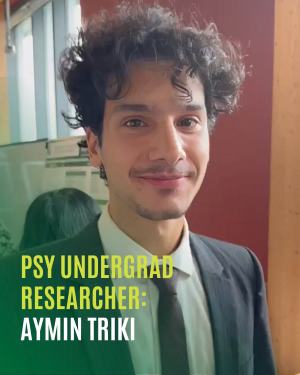PSY Undergrad Research Spotlight: Aymin Triki
August 2, 2024 - Shelly DeJong
 Aymin Triki, a senior psychology major on the pre-med track, is an undergraduate researcher in the Belief Systems Lab. This year, he received a PURI Award from the College of Social Science to help fund his research with Dr. Mark Brandt. We met with Aymin recently to talk about his research experience, what it's like presenting at UURAF and Mid-Sure, and more.
Aymin Triki, a senior psychology major on the pre-med track, is an undergraduate researcher in the Belief Systems Lab. This year, he received a PURI Award from the College of Social Science to help fund his research with Dr. Mark Brandt. We met with Aymin recently to talk about his research experience, what it's like presenting at UURAF and Mid-Sure, and more.
How did you end up studying psychology?
I took AP Psychology in high school and that's where I fell in love with the subject. I found that many of my interests benefited from knowledge about psychology, even the books I was reading at the time. As someone on the pre-med track, I wanted to study something that I could use to really help people and it has been a great fit.
How did you begin working in the Belief Systems Lab?
I was originally working in Joe Cesario’s Lab, and we were talking about what I wanted to do for my independent research project. I was curious about studying fragile masculinity in young men, false role models, and stuff like that. He suggested that I reach out to Dr. Mark Brandt because he specializes in belief systems. So, I joined Mark’s lab, and I've loved it ever since.
I've found that the research in social psychology aligns well with my interests. At first, I had some reservations about political psychology due to my jadedness towards politics, but I found it fascinating to study, especially its connection to beliefs and belief systems. The psychology aspect of politics is truly intriguing, especially in today's polarized world. I think political psychology has really resonated with me because it kind of transcends specific political policies or parties and becomes more a study on human beings.
 Can you tell us about your research project?
Can you tell us about your research project?
Currently, I am working on research with Mark involving the similarities and differences in the biased-reasoning processes of liberals and conservatives. Social and political psychologists have debated about the psychological similarities and differences between liberals and conservatives since at least 1950. A recent development in this debate was a meta-analysis looking at partisan bias that found both liberals and conservatives are equally susceptible to partisan bias. The meta-analysis gathered a range of studies that looked at partisan bias from party cues, which is additional partisan information on a policy that is meant to influence the participants’ opinion. Party cues typically influence the opinion of a participant in the same direction as their party or the opposite of an opposing party. The meta-analysis found that the effects of party cues was the same for both liberals and conservatives. However, that study was challenged for not using policy issues that were representative of contemporary political debates, suggesting that the study would have been unlikely to find support for conservatives being more biased.
We wanted to investigate this critique, so we found a study that used party cues on 34 contemporary policy issues, which was a large sample compared to other studies. We analyzed the dataset to test for any difference in party cue effects between liberals and conservatives and found no difference overall across the 34 issues. We’ve since analyzed another dataset suggested by the researcher whose dataset we used before and which includes 48 representative policies and found near-identical outcomes, further supporting our initial findings. Now, we plan to conduct our own survey with additional variables and with updated party cues. Our aim is to expand on the variables measured.
What does a typical day of research look like for you in this lab?
Mark and I usually meet once a week to catch up, touch base, and set goals for the next week. Lately, our meetings have been quite productive. With Mark's guidance, I’ve gotten experience reviewing literature, designing studies, conducting analyses in R, and scientific writing. I really appreciate that he teaches in a way the helps learn problem-solving skills, especially with coding and writing. Recently, I asked if we could set more ambitious goals, as I’ve really enjoyed the work and want to spend more of my free time on it. On a typical workday, I’ll usually go to a cafe and do a mix of reading papers related to our study, coding in R, and writing the draft of our paper.
You mentioned that you’ve discovered that you really enjoy research. Can you talk about that?
It's been quite an enriching journey for me. When I started the project with Mark, I didn't know much about scientific writing. However, since I got involved with this lab, I have been reading and delving deeper into research articles and journals. It doesn't feel much like homework; it's genuinely interesting and gratifying to learn about the forefront of the field of psychology. I’ve also found learning to write scientifically and doing the analyses in the study very rewarding. For the second dataset, Mark gave me free rein to try and to do the analysis myself, and I was surprised with how much I was able to do considering I knew so little about R before I joined the lab. Learning scientific writing is an ongoing journey. I remember when I first started, I was unsure about writing a research paper, but with Mark's guidance, I've been able to improve. While I still have a lot to learn, I find it fun to keep trying to improve my writing.
It’s great that you’re getting that kind of experience as an undergrad.
I'm truly grateful for Mark; he is a great mentor. There were many times when my ADHD has made it challenging for me, for example, when I wanted to increase my workload for the project. I approached Mark about it, and he suggested we try more ambitious goals each week, and that has worked well. He's very understanding and flexible. He explains ideas in a way that is easy to understand. He's also very down to earth.
What’s presenting your research like?
I was super nervous for UURAF for some reason. And then once I did it, I realized it was fun. So, I felt much more comfortable with Mid-Sure. It’s actually really cool that people come up and are interested in what you’ve researched. I get to show off what I’ve been doing.

